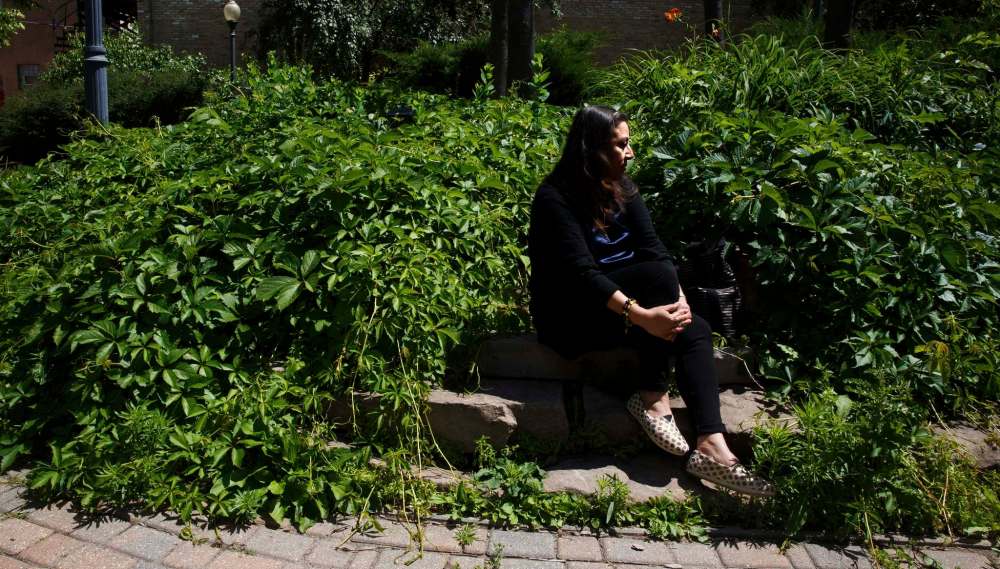Asylum seeker awaits ‘miracle’
Salvadoran woman hiding in North Dakota after being turned away at border
Advertisement
Read this article for free:
or
Already have an account? Log in here »
To continue reading, please subscribe:
Monthly Digital Subscription
$0 for the first 4 weeks*
- Enjoy unlimited reading on winnipegfreepress.com
- Read the E-Edition, our digital replica newspaper
- Access News Break, our award-winning app
- Play interactive puzzles
*No charge for 4 weeks then price increases to the regular rate of $19.00 plus GST every four weeks. Offer available to new and qualified returning subscribers only. Cancel any time.
Monthly Digital Subscription
$4.75/week*
- Enjoy unlimited reading on winnipegfreepress.com
- Read the E-Edition, our digital replica newspaper
- Access News Break, our award-winning app
- Play interactive puzzles
*Billed as $19 plus GST every four weeks. Cancel any time.
To continue reading, please subscribe:
Add Free Press access to your Brandon Sun subscription for only an additional
$1 for the first 4 weeks*
*Your next subscription payment will increase by $1.00 and you will be charged $16.99 plus GST for four weeks. After four weeks, your payment will increase to $23.99 plus GST every four weeks.
Read unlimited articles for free today:
or
Already have an account? Log in here »
Hey there, time traveller!
This article was published 09/07/2018 (2723 days ago), so information in it may no longer be current.
A single mom who was turned away after asking border guards at Emerson for refugee protection from gangs threatening her and her son in El Salvador, remains in hiding in North Dakota.
“Thank God, I feel good, I’m still here in Grand Forks,” said the woman, who can only be identified as Lizbeth.
She’s been sheltered by a North Dakota church group, and lives in constant fear U.S. Immigration and Customs Enforcement officials will deport her to El Salvador, where her 16-year-old son is hiding from gang members with his grandparents.

The situation in the Central American country is “increasingly violent and dangerous,” said Lizbeth, who is trying to find a way to get her son, Sebastian, out of El Salvador. “Now, I can only have faith and wait for a miracle.”
One such “miracle” would be Canada withdrawing from the Canada-U.S. Safe Third Country Agreement. It’s why Lizbeth was turned away at the Canadian port of entry at Emerson in October 2016 — the U.S. is considered to be safe for refugee claimants.
Under the Safe Third Country Agreement, anyone who presents themselves at a Canada-U.S. border post seeking to make a refugee claim in Canada is, with limited exceptions, denied access to the Canadian refugee system and immediately returned to the United States.
With what’s happened in recent weeks, it’s clear the U.S. cannot be considered a “safe” country for refugees, says the Canadian Council for Refugees, Amnesty International and the Canadian Council of Churches.
“Canadians have seen over the last few weeks how refugees are treated heartlessly in the U.S. under President (Donald) Trump: children separated from their parents, long-term detention in horrific conditions, criminal prosecution of people just for crossing the border to seek safety, new policies closing the door on women fleeing gender-based violence,” the organizations said on Monday in a joint news release.
In July 2017, they joined a litigant and her children who are asking the Federal Court to strike down the Safe Third Country Agreement, and allow her to make a refugee claim in Canada. In December 2017, the Federal Court granted the three organizations public interest standing.
On July 4, they filed evidence in Federal Court to support their legal challenge of the designation of the U.S. as a safe third country for refugees. The litigation is still in the preliminary stages, and a hearing is scheduled for January.
Lizbeth was unaware of the Canada-U.S. pact in October 2016, when she took her life savings and made her way from San Salvador through the U.S. to the Canadian port of entry at Emerson. In an interview with the Free Press in Grand Forks, N.D., last year, she said it never dawned on her that, in order to make a refugee claim in Canada, she would have to avoid authorities to get inside the country first.
Since the agreement does not apply to people who cross into Canada other than at an official border post, those seeking refugee protection have been crossing irregularly, sometimes risking life and limb — especially in the winter on the Prairies.
Withdrawing from the agreement would allow people to present themselves in a safe way at ports of entry, ending irregular crossings and dangerous journeys, say its critics, who are organizing a rally Wednesday in Winnipeg, at 6 p.m., on the steps of the legislative building.
carol.sanders@freepress.mb.ca

Carol Sanders
Legislature reporter
Carol Sanders is a reporter at the Free Press legislature bureau. The former general assignment reporter and copy editor joined the paper in 1997. Read more about Carol.
Every piece of reporting Carol produces is reviewed by an editing team before it is posted online or published in print — part of the Free Press‘s tradition, since 1872, of producing reliable independent journalism. Read more about Free Press’s history and mandate, and learn how our newsroom operates.
Our newsroom depends on a growing audience of readers to power our journalism. If you are not a paid reader, please consider becoming a subscriber.
Our newsroom depends on its audience of readers to power our journalism. Thank you for your support.
History
Updated on Tuesday, July 10, 2018 6:21 AM CDT: Final

